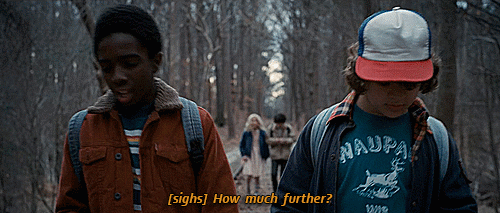
The attention for the Netflix original series, Stranger Things, might’ve cooled down since the hiatus before the upcoming season 3, but I haven’t stopped thinking about the show. As I was playing the soundtrack, I started thinking about some things the first two seasons taught me about storytelling.
While the show isn’t for everyone, and I’m no way saying for my followers to go watch it, I’m a fan of the show–so far. I’m disclaiming merely because I have no idea what season 3 will hold and am no way condoning the unknown. I enjoyed the first two seasons because they had soo many great lessons to learn… as a writer. What are those things I’ve learned? It is time for…
DON’T BE AFRAID TO BE WILD
Do not be afraid to write anything, period, about anything, ever (as long as God says it is OK, ha). What do I mean? I mean that 1.) There’s nothing new under the sun. 2.) So WRITE WILD.

It is OK to be cliche sometimes! Cliches in Stranger Things included: big bad things, little town. Big bad government with lots of secrets. The nerds/geeks get bullied all the time. Most of the parents (EXCEPT JOYCE! SHE IS QUEEN!) have no idea what is going on. Are cliches always good? Nah. But guess what? They don’t always lessen the quality of fiction. The cliches in Stranger Things didn’t make things less realistic. So why are writers so afraid of being cliche sometimes? Cliches aren’t the enemy, y’all.
It is OK to be wild and strange! Writers are creative beings. The sky is the limit! Some strange things Stranger Things had was: how diverse the cast was (kids/teens/adults all in one inter-woven story? yes please). Not everyone made it out alive. Not every main character was even likable or had heroic motives. The monsters weren’t cliche-scary. The spiritual ties were very real. Don’t be afraid to get wild, creative, inventive, crazy–just go for it. Don’t be afraid if it isn’t very ‘realistic’. If you’re writing spec-fic, fantasy, etc, you’re job is to twist reality. So go twist reality!
DON’T UNDERMINE YOUR AUDIENCE
If you’re a writer who markets your own books, you know how important it is to find your target audience. Stranger Things had a broad audience, since the characters are in three groups: middle schoolers, highschoolers, and adults. The story built off of the other groups because no one could find all of the puzzle pieces alone. It took all of them to push the story onward. Where am I going with this?

Let’s be real. A YA marketed novel probably isn’t going to be picked up by many mature adults. An adult mystery novel probably won’t be picked up by a teenager. The obvious reason is because different audiences want different things.
While it is important to know your audience and give them what they want, don’t undermine them. Don’t think “They came for a YA romance, so I can only write a bunch of fluff or a bunch of angst.” Don’t worry so much to fill your check-list of ‘This Is What My Audience Wants’ that you fall flat and don’t write your story. Challenge your reader. Give them something to think about. If you’re writing a romance, make it a bit more than that. If you’re writing a mystery, make it more than that, too. Stranger Things was a hit because it mixed in more than one subplot and focused on the heart of the story, challenging readers to think.
DON’T CLOSE THE (CURIOSITY) DOOR
Think of your favorite book or TV show. Why is it a favorite? What theme clings to you? What character shined brightly? Did the story make you laugh, cry, etc? WHY? Why did things stick with you, and what would you have done differently? Storytelling is a craft, a gift, something that is inside you, but it will never be perfected. Humans aren’t perfect. So don’t strive to be. Don’t write the perfect story. Write your story. Write a good one.

Stranger Things tapped into many important story telling techniques: strong character motivations, building anticipation and foreboding future situations, and using sensory details to capture people’s attentions. While writers can’t use an epic soundtrack to set a mood or portray emotions through lighting, we can use sensory details, spatial description, and set the mood in other ways. We can keep learning, exploring, and experiencing new things–it all helps. If you want your reader to remember your story, or get them to laugh, or get them to cry, or get them to see God’s hope–you have to tell them a story. You aren’t writing a nonfiction book or a police report or a recipe. You’re writing a story. And it isn’t easy. It takes effort, work, blood, sweat tears. You might wonder how much longer you can rewrite the same story.

But keep that door open. Keep faith in God, yourself, and the power of your story! Don’t skimp out on building up a scene. Don’t bog readers with information, but give just enough description where they want more. Don’t make a character give too many secrets, but make the reader wish they did. There is power in storytelling. So give it thought, and when it comes down to it, trust God to show you when the story is complete. Not perfect, not the new bestseller, not the next C.S. Lewis–but finished. You told your story the best you could, glorified God, and it is enough. Somebody needs your story. And that’s why we tell them.
~~~
I hope you enjoyed this post, friend! Feel free to leave your own thoughts (or, if you’ve seen the show, fangirl with me).

God bless,
Ang

Love it. 😛
*evil laughter*
There was a bit too much horror for me in the movie, but love your post! I especially love what you say about it writing a flat story to try and please your audience.
I loved the horror aspects! 😉 Glad you enjoyed it.
Great post, and everything’s true, except one.
*smiles mischievously*
I read a lot of adult books and I’m a teen. XD!!
SAMEEEE THOUGHHHH xD xD *glances at Henderson, Peretti, Dekker, etc* 😛
XD!!!!!!!!! YES!!!!!!!
Reblogged this on ShadowverseJC and commented:
Great piece!
I will legitimately be that one adult who reads MG and YA for her entire life. 😂
Loved all your points!
SAME HEREEEE. MG THOUGH MAN. *cries*
Thanks, Jane! ♥
Jane, I didn’t know you followed this blog too!! 😀
Haha, surprise! I follow a lot of blogs, I’m just notoriously bad at commenting. 😅
XD! I do too, but I’ve made it a point to comment every time. XD!! XXD!!!
Great advice! I’ve liked Stranger Things (so far), too! I really like how they told their story and agree with you that there’s a lot to learned about good storytelling from the series. I hope season three is a good one!
I’m really hoping so, too, haha! 😀 Thanks for reading.